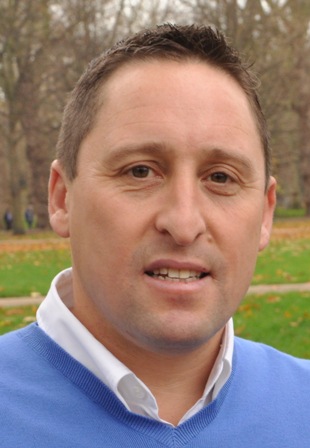
Edition number 4; dateline 2 December 2009
Who’s whom
Either people aren’t moving or they aren’t telling us but a couple of noteworthy people have been unpacking their satchels at another desk this month:
At the beginning of November “millionaire motivational speaker”* Frank Dick took up his position as chair of Scottish Athletics and has since been joined by Canadian head coach Laurieu Primeau; Richard Kennedy and Ian Sinclair have joined British Cycling’s board of directors; ISRM have a new CEO in Sean Holt (see right) while Ralph Riley picks up some hours on the technical side; and Arts Council England have appointed senior managers Simon Fitch, Dom Jinks and Rebecca Blackman to cover funding, regional planning and corporate planning respectively in the East Midlands. Meanwhile, the CCPR is delighted to welcome Martin Key as its new recreational space policy officer. Martin joins CCPR from The Ramblers and brings with him a wide range of rights of way and land access experience.
*according to the heraldscotland.com website
Will the new focus on and funding for the governing bodies of sport have any affect on medals or participation? Who knows, but it is affecting the jobs market:
The Rugby Football League are looking for a league for all officer in the North West and a match officials coach in Leeds and in Manchester British Cycling need an events development officer to focus on track, disability and cycle speedway. Rugby and volleyball are both recruiting community coaches whilst Gymnastics England are after county development officers who are “in travelling distance” of Cumbria and Tyne & Wear. Elsewhere in the career landscape: thanks to a big win on the Heritage Lottery British Waterways are advertising for an entire project team, from an ecologist to a habitats officer to a project manager to work on a £2.8m scheme on the River Trent near Newark; the Fitzwilliam Museum in Cambridge will dust off a cool £40,000-plus bonus for a managing director with “a solid record in retailing and trading”; Margate-based gallery Turner Contemporary are putting together a management team with job titles involving development, finance, learning, communications and of course curator; and the Academy of Ancient Music wants to pay an “inspirational arts professional” a competitive salary to be its chief executive. And further afield the Australian Rugby Union, the home of the Qantas Wallabies, apparently need a partnerships manager to “provide best practice and specialist knowledge in relationship management of commercial supply stakeholders” but sadly only second-hand car salesmen with Australian visas can apply.
Download a pdf version of this article for printing
the people page
comings, goings and a personal spotlight
Spotlight: Sean Holt
Current position?
I have recently been appointed the CEO of the Institute of Sport and Recreation Management following a short period at the Amateur Swimming Association as the interim director of partnerships. Prior to this I was the regional director for Sport England in London.
Your biggest challenge over the next twelve months?
These are tough economic times and the ISRM will not be immune to the downturn. The challenge will be to continue to develop the organisation by retaining and growing our membership, by offering high-quality services and support that adds real value to our members in both the private and public sectors. We will need to work closely with our partners and stakeholders to ensure we are truly representative of the industry and gain their confidence so that we can influence future policy initiatives at the highest level. Finally, our ambition with ISPAL, to achieve chartered status – I look forward to working with them.
Which job within the sport, leisure and culture sector would you most like to do?
That is fairly straightforward: the one that I am about to embark upon. I think it is a fantastic opportunity to enhance and develop the ISRM and I am really looking forward to working with the team and the trustees to meet the challenges ahead, while giving the industry the leadership and influence at the strategic and political level.
Who or what has inspired you in your career?
I have been fortunate to work with and for some inspiring people. Derek Casey, Ian Fytche and Roger Draper at Sport England, to name but a few. What really inspires me, however, is the difference sport and leisure can make to people’s lives.
What advice would you offer to a young person entering this industry?
This is a great industry to work in. It is diverse and there are a plethora of opportunities for those people who want to carve out a career in the sector. However, it is competitive and at times difficult to secure your first job on the career ladder. Skills are critically important, as is gaining a breadth of experience. In this context I would advise any young person to get a range of qualifications or CPDs under their belt.
Which single thing could improve the sector?
We are often accused of not being truly representative with a coherent voice. It is my intention to change that.
What could the sector do without?
It is not a case of what it can do without. I think the sector is strong and vibrant; everyone involved plays a part to ensure the sector makes a positive contribution to a range of social and economic agendas. To do this, the sector requires strong leadership and direction. I am determined that the ISRM plays a key role to provide this.
Where do you hope to be in ten years' time?
I am not sure but what I do know is that the sport and leisure sector is dynamic and progressive, and with the current push to increase and widen participation, and with the much vaunted decade of sport ahead of us, if there is one industry to be in, it is this one.
